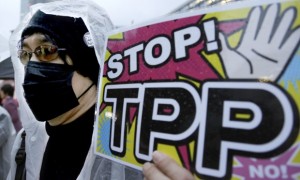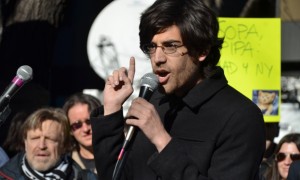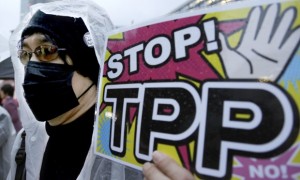The TPP has drawn the ire of Democrats including Elizabeth Warren who object it will destroy jobs, limit online freedom, increase outsourcing and derail climate agreements. Ironically, it has made allies of his (her?) GOP rivals.

A protester holds a placard during a rally against the Trans-Pacific Partnership (TPP) in Tokyo. Photograph: Shizuo Kambayashi/AP
The Trans Pacific Partnership is a trade agreement so significant and important, its details can’t be disclosed.
The TPP, sure to make an appearance during tonight’s State of the Union, is a 21st-century trade agreement involving 11 Asian countries along the Pacific Rim, and said to cover 40% of the world’s economy.
The TPP is a subject close to the heart – and the economic plans – of President Obama. In a November trip to Beijing, he urged other world leaders to finalize the agreement, calling it a “high priority” that would strengthen American leadership in the Asia-Pacific region and lead to growth, investment and job prospects for more workers.
The administration has argued that the deal will allow lower tariffs for American exports, in an environment of increasing competition, especially from China. Obama is also touting the deal as a boon for small businesses. When 98% of the US’s exporters are small businesses, new trade partnerships will help them create even more jobs, he proclaimed in last year’s State of the Union address. “Listen, China and Europe are not standing on the sidelines. Neither should we.”
Right now, American citizens will have to take those promises about the impact of the TPP on faith.
The TPP is one of the largest international trade agreements the US will sign, yet most of it is mired in secrecy. Congress won’t have access to the TPP before it is signed, and the terms won’t be publicly disclosed – ironic since the negotiations include 600 corporate advisers, including representatives of Halliburton and Caterpillar.
A chunk of the trade deal was leaked most recently by a Wikileaks release. “Everything we know about it are from document leaks,” says Maira Sutton, a policy analyst at the Electronic Frontier Foundation.
That sets light to the anger of Senator Bernie Sanders, who has called the TPP “disastrous” and “written behind closed doors by the corporate world”. He denounced its purpose “to protect the interests of the largest multinational corporations at the expense of workers, consumers, the environment and the foundations of American democracy.”
It’s not just Sanders, who is among the most progressive in Congress. Democrats have long expressed their opposition to the deal, even though 14 unions and consumer groups and environmental groups are also involved in the negotiations.
No matter: the president says he is ready to defy his fellow Democrats to push through the TPP. In a case of odd bedfellows, Obama has found new Republican allies in pursuing the deal.
US trade representative Michael Froman promised that the Trans Pacific Partnership was on course and due in as little as two months.
Obama’s State of the Union address should give the TPP another push – even as public interest groups, trade experts and digital freedom advocates voice their criticism of the agreement, particularly its secrecy.
‘Don’t fight the last war’

The US vice-president, Joe Biden, and House speaker John Boehner of Ohio listen as President Barack Obama gives his State of the Union address on Capitol Hill in Washington, claiming that the TPP will lead to more small business job creation. Photograph: Charles Dharapak/AP
What makes the TPP distasteful to experts is its resemblance to the North American Free Trade Agreement (Nafta), signed in 1994 between the US, Canada and Mexico.
Post-Nafta, the US saw a mass exodus of jobs, with nearly 700,000 jobs offshored, 60.8% of them in manufacturing.
Now as the Obama administration uses the same verbiage as the Clinton administration used two decades ago, trade experts are alarmed at what is to come. The incentives of the Trans Pacific Partnership are going to cause millions of additional jobs to be lost, says Lori Wallach, the director of Global Trade Watch.
Wallach quotes the Department of Labor statistics to show that the workers in the US who lose their jobs to trade agreements in the manufacturing sector when re-employed earn only three-quarters of their original earnings, in three out of five cases.
“The opposition to the trade agreement comprises unions, environmental, consumer groups – in other words, the entire Democratic base,” says Wallach.
Wallach says that the agreement is based on the terms of the US-Korea free-trade agreement, which were derived from Nafta. The complications include limits on food safety and a ban on the export of gas derived from fracking – which “would limit our ability to have energy policies to combat the climate crisis”, Wallach says.
Another complication: the terms of the TPP won’t be open to debate. A fast-track treatment is likely, with Congress implementing the deal without changes.
“The president wants the authority to railroad through Congress to sign the agreement even before Congress,” explains Wallach, saying it delegates congressional authority to the president.
Yet Obama insists that the TPP’s terms are new and improved. The president’s only advice to critics: “Don’t fight the last war.”
‘It copies and pastes US law into international law’
The Trans Pacific Partnership, although billed as a trade agreement, includes provisions on intellectual property and copyright that are usually outside the boundaries of trade, critics say.
For instance, there is a scuffle around the TPP’s rumored treatment of Digital Rights Management tools, which corporations use to limit access to digital devices – often to prevent piracy.
TPP has provisions that make it a crime to break these locks, and to do things that aren’t even copyright infringement.
“These DRM laws prevent us from doing that research legally,” says Maira Sutton, a policy analyst at Electronic Frontier Foundation. “That’s our main concern.”
Sutton objects that the TPP will extend problematic US laws into international law. One example: the Computer Fraud and Abuse Act, which prosecutors used to hound open-web advocate Aaron Swartz.
“Similar provisions in the TPP that will prevent whistleblowers and journalists from accessing or ‘disclosing’ trade secrets through a computer system,” Sutton says.

Information access advocate Aaron Swartz speaks to a crowd. Photograph: Daniel J. Sieradski/dpa/Corbis
Sutton adds that the recent Sony hacks would not be reported freely under the provisions of the TPP, says Sutton.
The third issue the EFF is concerned with is that of intermediary liability, which burdens ISPs and websites with stricter copyright infringement laws in a way that is veiled censorship, cautions Sutton.
Climate activists up in arms
Climate activists have been the most vociferous in opposing the TPP’s many terms. As John Fullerton wrote in the Guardian: “What few seem to realize is that this agreement, if approved as is, could make it virtually impossible for the United States to meet its current and future climate pledges.”
Elizabeth Warren too has come out against the deal. In a letter to Froman last year, Warren and two other Senators objected that the TPP “could make it harder for Congress and regulatory agencies to prevent future financial crises”.

Senator Elizabeth Warren of Massachusetts wrote to Michael Froman, objecting to the TPP’s terms that undermine major Wall Street reform. Photograph: Jose Luis Magana/AP
Warren and others have raised concern over a provision called “investor-state dispute settlement” which gives foreign corporations the political power to challenge US laws in front of a small private group of attorneys that answers to no country.
“If the foreign country prevails, the panel can order compensation from American taxpayers without any review by American courts,” Warren warned. One such panel in 2006 forced the Czech Republic to pay $236m to a Dutch bank for not providing it with a bailout, Warren wrote.
Even though dissent is plenty, the means for these public advocates to get involved in the TPP are few.
Public interest groups that want to be on trade advisory committees in order to participate in the negotiations are required to sign non-disclosure agreements, which robs them of the voice to object.
Sutton, of the EFF, says it is the organization’s responsibility to share information with the public and to do public advocacy.
“If we were to sign on to this trade advisory committee to influence the text, then we tie our hands behind our backs to do the work that we need to do,” she tells the Guardian.


